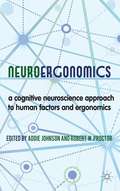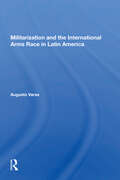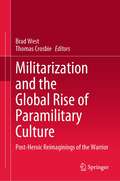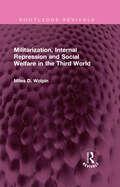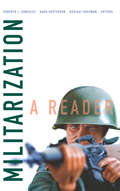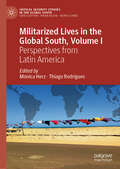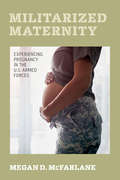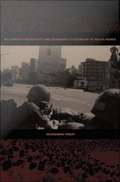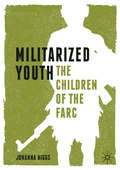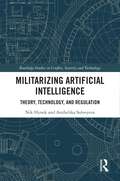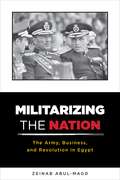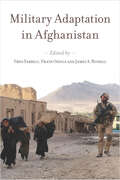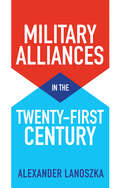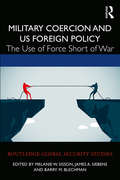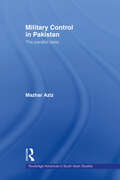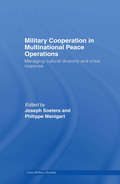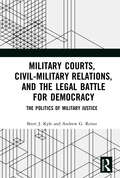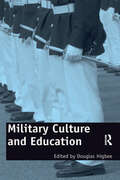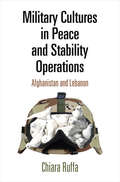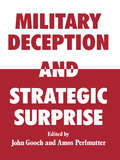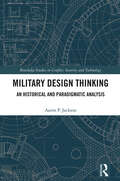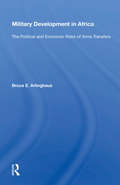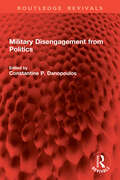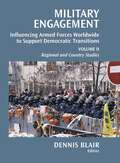- Table View
- List View
Militarism and the British Left, 1902–1914: 1902-1914
by Matthew JohnsonMilitarism has traditionally been regarded as a phenomenon of the political right. As this book demonstrates, however, various groups on the political left in Britain during the years before the Great War were able to accommodate, and even assimilate, militaristic ideas, sentiments, and policies to a remarkable degree.
Militarization And The International Arms Race In Latin America
by Augusto VarasMilitary conflicts and dictatorships in Latin America are the main consequences of the increasingly autonomous role of the armed forces in the region, asserts noted scholar Augusto Varas, and international factors related to the expansion of weapon industries in the North and the increasing flow of financial resources to Latin America are accelerating the arms race. Varas discusses the historical function of the armed forces in local politics, the new ideology of the "national security doctrine," and the process of conflict perception by the Latin American military. He also analyzes the inevitable relations between the arms race and the political role of the region's armed institutions. Using Chile as an example, he places these factors in context and illustrates how political crisis can escalate into a regional arms race. He then concludes with a discussion of the links between prospects for democracy in the region and demilitarization and disarmament.
Militarization and the Global Rise of Paramilitary Culture: Post-Heroic Reimaginings of the Warrior
by Brad West Thomas CrosbieThis edited book demonstrates a new multidimensional comprehension of the relationship between war, the military and civil society by exploring the global rise of paramilitary culture. Moving beyond binary understandings that inform the militarization of culture thesis and examining various national and cultural contexts, the collection outlines ways in which a process of paramilitarization is shaping the world through the promotion of new warrior archetypes. It is argued that while the paramilitary hero is associated with military themes, their character is in tension with the central principals of modern military organization, something that often challenges the state’s perceived monopoly on violence. As such paramilitization has profound implications for institutional military identity, the influence of paramilitary organizations and broadly how organised violence is popularly understood
Militarization, Internal Repression and Social Welfare in the Third World (Routledge Revivals)
by Miles D WolpinFirst published in 1986, Militarization, Internal Repression and Social Welfare in the Third World argues that there is a relationship between the level of a regime’s military spending and the degree of internal repression it inflicts. This book presents a detailed empirical analysis of this situation and presents the results of more than three dozen researchers who have published comparative or case studies of the substitution effects of military expenditures in socio-economic areas. While the primary concern is with the Third World, the book also analyses the costs to advanced capitalist and to state socialist systems and discusses their role in further militarization. This book will be of interest to students of political science, international relations, colonialism and area studies.
Militarization: A Reader (Global Insecurities)
by Roberto J. GonzálezMilitarization: A Reader offers a range of critical perspectives on the dynamics of militarization as a social, economic, political, cultural, and environmental phenomenon. It portrays militarism as the condition in which military values and frameworks come to dominate state structures and public culture both in foreign relations and in the domestic sphere. Featuring short, readable essays by anthropologists, historians, political scientists, cultural theorists, and media commentators, the Reader probes militarism's ideologies, including those that valorize warriors, armed conflict, and weaponry. Outlining contemporary militarization processes at work around the world, the Reader offers a wide-ranging examination of a phenomenon that touches the lives of billions of people. In collaboration with Catherine Besteman, Andrew Bickford, Catherine Lutz, Katherine T. McCaffrey, Austin Miller, David H. Price, David Vine
Militarized Lives in the Global South, Volume I: Perspectives from Latin America (Critical Security Studies in the Global South)
by Thiago Rodrigues Monica HerzIn this book we propose to tackle militarization trends in Latin America which include the presence of the military organizations in some vital national economic activities, the ethics and aesthetics of the ‘military’ in popular forms of entertainment, the active engagement of military personnel in criminal activities, the Armed Forces intervention in electoral processes, the Armed Forces engagement in the cybersphere and cyberwarfare, their participation in civil defense operations, their emulation by militias, gangs and other armed non-state actors. We shall consider militarization on multiple scales from the individual body and subjectification processes to international politics from the everyday experiences and practices to the development of national strategies in Latin America and we shall avoid the dichotomy between a militarized moment and space and a demilitarized moment and space.
Militarized Maternity: Experiencing Pregnancy in the U.S. Armed Forces
by Megan D. McFarlaneThe rights of pregnant workers as well as (the lack of) paid maternity leave have increasingly become topics of a major policy debate in the United States. Yet, few discussions have focused on the U.S. military, where many of the latest policy changes focus on these very issues. Despite the armed forces' increases to maternity-related benefits, servicewomen continue to be stigmatized for being pregnant and taking advantage of maternity policies. In an effort to understand this disconnect, Megan McFarlane analyzes military documents and conducts interviews with enlisted servicewomen and female officers. She finds a policy/culture disparity within the military that pregnant servicewomen themselves often co-construct, making the policy changes significantly less effective. McFarlane ends by offering suggestions for how these policy changes can have more impact and how they could potentially serve as an example for the broader societal debate.
Militarized Modernity and Gendered Citizenship in South Korea
by Seungsook MoonThis pathbreaking study presents a feminist analysis of the politics of membership in the South Korean nation over the past four decades. Seungsook Moon examines the ambitious effort by which South Korea transformed itself into a modern industrial and militarized nation. She demonstrates that the pursuit of modernity in South Korea involved the construction of the anticommunist national identity and a massive effort to mold the populace into useful, docile members of the state. This process, which she terms "militarized modernity," treated men and women differently. Men were mobilized for mandatory military service and then, as conscripts, utilized as workers and researchers in the industrializing economy. Women were consigned to lesser factory jobs, and their roles as members of the modern nation were defined largely in terms of biological reproduction and household management. Moon situates militarized modernity in the historical context of colonialism and nationalism in the twentieth century. She follows the course of militarized modernity in South Korea from its development in the early 1960s through its peak in the 1970s and its decline after rule by military dictatorship ceased in 1987. She highlights the crucial role of the Cold War in South Korea's militarization and the continuities in the disciplinary tactics used by the Japanese colonial rulers and the postcolonial military regimes. Moon reveals how, in the years since 1987, various social movements--particularly the women's and labor movements--began the still-ongoing process of revitalizing South Korean civil society and forging citizenship as a new form of membership in the democratizing nation.
Militarized Youth: The Children of the FARC
by Johanna HiggsBased on ethnographic fieldwork and interviews from across Colombia—including former child guerillas, former hostages of the guerilla organization, mothers of child soldiers, and humanitarian aid workers— this volume explores the experiences of children involved with the Colombian guerilla group the Fuerzas Armadas Revolucionarias de Colombia (Farc). Going beyond the predominant humanitarian perspectives on child soldiers, Johanna Higgs delves into the specific social and cultural aspects of the Colombian conflict to give a contextualized, culturally relevant understanding of the processes of both militarization and demobilization of children, deploying the theoretical lens of “lifeworlds.” In so doing, Higgs not only provides insight into children’s involvement in conflict in Colombia, but presents a clear case for a move away from homogenized understandings of “child soldiers,” thus far dominated by viewpoints from industrialized Western nations. Tying together perspectives from anthropology, sociology, psychology, politics, and international development, Higgs provides not only a much-needed examination of how children are militarized, soldiering in the Farc context, and demilitarization, but also a blueprint for how research can be tied to specific cultural contexts.
Militarizing Artificial Intelligence: Theory, Technology, and Regulation (Routledge Studies in Conflict, Security and Technology)
by Nik Hynek Anzhelika SolovyevaThis book examines the military characteristics and potential of Artificial Intelligence (AI) in the new global revolution in military affairs. Offering an original perspective on the utilization, imagination, and politics of AI in the context of military development and weapons regulation, the work provides a comprehensive response to the question of how we might reflect on the AI revolution in warfare and what can be said about the ways in which this has been handled. In the first part of the book, AI is accommodated, both theoretically and empirically, in the strategic context of the 'Revolution in Military Affairs' (RMA). The book offers a novel understanding of autonomous weapons as multi-layered composite systems, pointing to a complex, non-linear interplay between evolutionary and revolutionary dynamics. In the second section, the book provides an impartial analysis of the related politics and operations of power, whereby increases in military budgets and R&D of the great powers are met and countered by advocacy networks and scientists campaigning for a ban on lethal autonomous weapons. As such, it moves beyond popular caricatures of ‘killer robots’ and points out some of the problems which result from over-reliance on such imagery. This book will be of much interest to students of strategic studies, critical security studies, arms control and disarmament, science and technology studies and general International Relations.
Militarizing the Environment: Climate Change and the Security State
by Robert P. MarzecAs the seriousness of climate change becomes more and more obvious, military institutions are responding by taking a prominent role in the governing of environmental concerns, engaging in &“climate change war games,&” and preparing for the effects of climate change—from conflicts due to loss of food, water, and energy to the mass migration of millions of people displaced by rising sea levels. This combat-oriented stance stems from a self-destructive pattern of thought that Robert P. Marzec names &“environmentality,&” an attitude that has been affecting human–environmental relations since the seventeenth century.Militarizing the Environment traces the rise of this influential mindset in America and other nations that threatens to supplant ideas of sustainability with demands for adaptation. In this extensive historical study of scientific, military, political, and economic formations across five centuries, Marzec reveals how environmentality has been instrumental in the development of today&’s security society—informing the creation of the military-industrial complex during World War II and the National Security Act that established the CIA during the Cold War.Now embedded in contemporary Western thought, environmentality has even infiltrated scientific thinking—transforming Darwinian insights into a quasi-theology that makes security the biological basis of existence. Marzec exposes the self-destructive nature of this increasingly accepted worldview and offers alternatives that counter the blind alleys of national and global security.
Militarizing the Nation: The Army, Business, and Revolution in Egypt
by Zeinab Abul-MagdEgypt's army portrays itself as a faithful guardian "saving the nation." Yet saving the nation has meant militarizing it. Zeinab Abul-Magd examines both the visible and often invisible efforts by Egypt's semi-autonomous military to hegemonize the country's politics, economy, and society over the past six decades. The Egyptian army has adapted to and benefited from crucial moments of change. It weathered the transition to socialism in the 1960s, market consumerism in the 1980s, and neoliberalism from the 1990s onward, all while enhancing its political supremacy and expanding a mammoth business empire. Most recently, the military has fought back two popular uprisings, retained full power in the wake of the Arab Spring, and increased its wealth.While adjusting to these shifts, military officers have successfully transformed urban milieus into ever-expanding military camps. These spaces now host a permanent armed presence that exercises continuous surveillance over everyday life. Egypt's military business enterprises have tapped into the consumer habits of the rich and poor alike, reaping unaccountable profits and optimizing social command. Using both a political economy approach and a Foucauldian perspective, Militarizing the Nation traces the genealogy of the Egyptian military for those eager to know how such a controversial power gains and maintains control.
Military Adaptation in Afghanistan
by Theo Farrell, Frans Osinga and James A. RussellWhen NATO took charge of the International Security Assistance Force (ISAF) for Afghanistan in 2003, ISAF conceptualized its mission largely as a stabilization and reconstruction deployment. However, as the campaign has evolved and the insurgency has proved to more resistant and capable, key operational imperatives have emerged, including military support to the civilian development effort, closer partnering with Afghan security forces, and greater military restraint. All participating militaries have adapted, to varying extents, to these campaign imperatives and pressures. This book analyzes these initiatives and their outcomes by focusing on the experiences of three groups of militaries: those of Britain, Canada, Denmark, the Netherlands, and the US, which have faced the most intense operational and strategic pressures; Germany, who's troops have faced the greatest political and cultural constraints; and the Afghan National Army (ANA) and the Taliban, who have been forced to adapt to a very different sets of circumstances.
Military Alliances in the Twenty-First Century
by Alexander LanoszkaAlliance politics is a regular headline grabber. When a possible military crisis involving Russia, North Korea, or China rears its head, leaders and citizens alike raise concerns over the willingness of US allies to stand together. As rival powers have tightened their security cooperation, the United States has stepped up demands that its allies increase their defense spending and contribute more to military operations in the Middle East and elsewhere. The prospect of former President Donald Trump unilaterally ending alliances alarmed longstanding partners, even as NATO was welcoming new members into its ranks. Military Alliances in the Twenty-First Century is the first book to explore fully the politics that shape these security arrangements – from their initial formation through the various challenges that test them and, sometimes, lead to their demise. Across six thematic chapters, Alexander Lanoszka challenges conventional wisdom that has dominated our understanding of how military alliances have operated historically and into the present. Although military alliances today may seem uniquely hobbled by their internal difficulties, Lanoszka argues that they are in fact, by their very nature, prone to dysfunction.
Military Coercion and US Foreign Policy: The Use of Force Short of War (Routledge Global Security Studies)
by Melanie W. SissonThis book examines the use of military force as a coercive tool by the United States, using lessons drawn from the post-Cold War era (1991–2018). The volume reveals that despite its status as sole superpower during the post-Cold War period, US efforts to coerce other states failed as often as they succeeded. In the coming decades, the United States will face states that are more capable and creative, willing to challenge its interests and able to take advantage of missteps and vulnerabilities. By using lessons derived from in-depth case studies and statistical analysis of an original dataset of more than 100 coercive incidents in the post-Cold War era, this book generates insight into how the US military can be used to achieve policy goals. Specifically, it provides guidance about the ways in which, and the conditions under which, the US armed forces can work in concert with economic and diplomatic elements of US power to create effective coercive strategies. This book will be of interest to students of US national security, US foreign policy, strategic studies and International Relations in general.
Military Control in Pakistan: The Parallel State (Routledge Advances in South Asian Studies #Vol. 8)
by Mazhar AzizThis volume examines the role of the military, the most influential actor in Pakistan, and challenges conventional wisdom on the causes of political instability in this geographically important nuclear state. It rejects views that ethnic and religious cleavages and perceived economic or political mismanagement by civilian governments triggers military intervention in Pakistan. The study argues instead that the military intervenes to remove civilian governments where the latter are perceived to be undermining the military’s institutional interests. Mazhar Aziz shows that the Pakistani military has become a parallel state, and given the extent of its influence, will continue to define the nature of governance within the polity. Overall, Military Control in Pakistan is a timely reminder and an important resource for both scholars and policy makers, clearly demonstrating the need to refocus attention on the problem of an influential military whilst drawing appropriate conclusions about issues ranging from democratic norms, political representation and civilian-military relations.
Military Cooperation in Multinational Peace Operations: Managing Cultural Diversity and Crisis Response (Cass Military Studies)
by Joseph Soeters Philippe ManigartThis edited volume uses theoretical overviews and empirical case studies to explore both how soldiers cope with the new forms of cultural diversity occurring within various multinational military operations, and how their organizations manage them. Military organizations, like other complex organizations, are now operating in an ever more diverse environment, with the missions themselves being ever more varied, and mostly conducted in a multinational framework. Members of the military have to deal with a host of international actors in the theatre of operations, and do so in a foreign cultural environment, often in countries devastated by war. Such conditions demand a high level of intercultural competence. It is therefore crucial for military organizations to understand how military personnel manage this cultural diversity. This book will be of much interest to students of peace operations, military studies, international security, as well as sociology and business studies.
Military Courts, Civil-Military Relations, and the Legal Battle for Democracy: The Politics of Military Justice
by Andrew G. Reiter Brett J. KyleThe interaction between military and civilian courts, the political power that legal prerogatives can provide to the armed forces, and the difficult process civilian politicians face in reforming military justice remain glaringly under-examined, despite their implications for the quality and survival of democracy. This book breaks new ground by providing a theoretically rich, global examination of the operation and reform of military courts in democratic countries. Drawing on a newly created dataset of 120 countries over more than two centuries, it presents the first comprehensive picture of the evolution of military justice across states and over time. Combined with qualitative historical case studies of Colombia, Portugal, Indonesia, Fiji, Brazil, Pakistan, and the United States, the book presents a new framework for understanding how civilian actors are able to gain or lose legal control of the armed forces. The book’s findings have important lessons for scholars and policymakers working in the fields of democracy, civil-military relations, human rights, and the rule of law.
Military Culture and Education: Current Intersections of Academic and Military Cultures
by Douglas HigbeeWhile studies of American military culture have proliferated in recent years, and the culture of academic institutions has been a subject of perennial interest, comparatively little has been written on the multiple ways the military and academe intersect. Focusing on this subject offers an opportunity to explore how teachers and researchers straddle the two quite different cultures. The contributors to this volume both embody and articulate how the two cultures co-exist and cooperate, however unevenly at times. Chapters offer both ground-level perspectives of the classroom and campus as well as well-considered articulations of the tensions and opportunities involved in teaching and training civic-minded soldiers on issues especially important in the post-9/11 world.
Military Cultures in Peace and Stability Operations: Afghanistan and Lebanon
by Chiara RuffaAs of September 2017, the United Nations alone deployed 110,000 uniformed personnel from 122 countries in fifteen peacekeeping operations worldwide. Soldiers in these missions are important actors who not only have considerable responsibility for implementing peace and stability operations but also have a concomitant influence on their goals and impact. Yet we know surprisingly little about the factors that prompt soldiers' behavior. Despite being deployed on the same mission under similar conditions, various national contingents display significant, systematic differences in their actions on the ground.In Military Cultures in Peace and Stability Operations, Chiara Ruffa challenges the widely held assumption that military contingents, regardless of their origins, implement mandates in a similar manner. She argues instead that military culture—the set of attitudes, values, and beliefs instilled into an army and transmitted across generations of those in uniform —influences how soldiers behave at the tactical level. When soldiers are abroad, they are usually deployed as units, and when a military unit deploys, its military culture goes with it. By investigating where military culture comes from, Ruffa demonstrates why military units conduct themselves the way they do.Between 2007 and 2014, Ruffa was embedded in French and Italian units deployed under comparable circumstances in two different kinds of peace and stability operations: the United Nations Interim Force in Lebanon and the NATO mission in Afghanistan. Based on hundreds of interviews, she finds that while French units prioritized patrolling and the display of high levels of protection and force—such as body armor and weaponry—Italian units placed greater emphasis on delivering humanitarian aid. She concludes that civil-military relations and societal beliefs about the use of force in the units' home country have an impact on the military culture overseas, soldiers' perceptions and behavior, and, ultimately, consequences for their ability to keep the peace.
Military Deception and Strategic Surprise!
by John Gooch Amos PerlmutterPublished in 2004, Military Deception and Strategic Surprise! is a valuable contribution to the field of Military and Strategic Studies.
Military Design Thinking: An Historical and Paradigmatic Analysis (Routledge Studies in Conflict, Security and Technology)
by Aaron P. JacksonThis book examines the newly emergent field of military design thinking, how it has been developed inside and outside of military doctrine, and the paradigms that underlie its key thinkers and methodologies.From the emergence of its initial methodologies in the late 1990s, military design thinking’s development rapidly accelerated in the mid-2000s in response to perceived failures of existing military doctrine and practice to adapt to the wars of the early 21st century. To establish a foundation for exploring the significance of the challenge military design thinking presented to dominant approaches to warfare, the early chapters in the book examine the ontology and epistemology of military doctrine, which is defined as a written expression of a military’s institutional belief system regarding how to wage war. They also explain how attempts to incorporate military design thinking into doctrine ultimately led to its assimilation into this belief system, requiring military design thinkers to continue to explore and develop the field outside of doctrine. Since the mid-2010s, non-doctrinal military design methodologies have become increasingly prominent within several Western militaries, including the US, Canada, UK, Australia, and several European militaries. Later chapters offer an exploration of the paradigms underlying non-doctrinal as well as doctrinal design methodologies. This book highlights how the field has evolved, shows how military design thinking differs from its ‘civilian’ equivalents developed in fields such as commerce and business management, and discusses how it may evolve in the near future.This book will be of much interest to students of military studies, security studies, and international relations, as well as to military professionals.
Military Development In Africa: The Political And Economic Risks Of Arms Transfers
by Bruce E. ArlinghausIncreases in the number and improvements in the quality of arms transferred to sub-Saharan African nations clearly will affect those nations' economic development and political stability both immediately and in the long term. Problems of technology absorption, manpower development, and the diversion of financial and human resources occasioned by such transfers become more and more critical as the demand for military modernization by African governments grows and the industrial nations compete to meet the demand. Dr. Arlinghaus evaluates conflicting assessments of the costs and benefits of military development from the perspective that it would be best for African nations to allocate resources for defense on the basis of socioeconomic considerations as well as their military and political goals.
Military Disengagement from Politics (Routledge Revivals)
by Constantine P. DanopoulosFirst published in 1988, Military Disengagement from Politics explores the reasons and conditions for military withdrawal from politics. It gives an in-depth analysis of specific grounds and circumstances of a representative list of countries whose military intervened, ruled, and eventually withdrew allowing for either full-scale civilian rule, or a more circumscribed set up in which the armed forces retain varying degrees of control in the governing process.The book provides a comparative and cross-cultural examination of eight countries covering a wide region of the world. It offers a carefully chosen array of case studies representing Asia, Africa, Europe, the Middle East, and Central and South America. This volume is a must read for students and researchers of political science.
Military Engagement
by Dennis C. BlairThe response of an autocratic nation's armed forces is crucial to the outcome of democratization movements throughout the world. But how can military officers and defense officials in democratic nations persuade their counterparts in autocratic regimes to favor democratic transitions? Here, Admiral Dennis Blair confronts this hard-edged challenge with a primer on the factors that affect military behavior during democratic transitions. Military Engagement makes the strong case for why the armed forces of any country should favor democracy and why, contrary to conventional wisdom, many military leaders have supported democratic transitions in different regions of the world. Further, it explains why military support, active or tacit, is essential to the success of any demo cratic transition. Blair provides incisive commentary on civil-military relations and outlines the foundational elements of armed forces in a democratic country. He presents sound advice to defense officials and military leaders in established democracies that can be put into practice when interacting with colleagues in both autocratic regimes and those that have made the break with dictatorship.This succinct handbook analyzes democratic transitions in five major regions and surveys the internal power dynamics in countries such as Iran and North Korea, dictatorships that are hostile toward and fearful of democratic influences. Blair juxtaposes the roles, values, and objectives of military leaders in autocratic nations with those in democracies. In turn, Military Engagement highlights how crossnetworking with international military delegations can put external pressure on autocratic countries and persuade them that democracies are best not only for the country itself, but also for the armed forces. Volume one of this two-volume project provides the educational foundation necessary so that military officers from established democracies can raise their game in achieving effective dialogue on democratic development.
